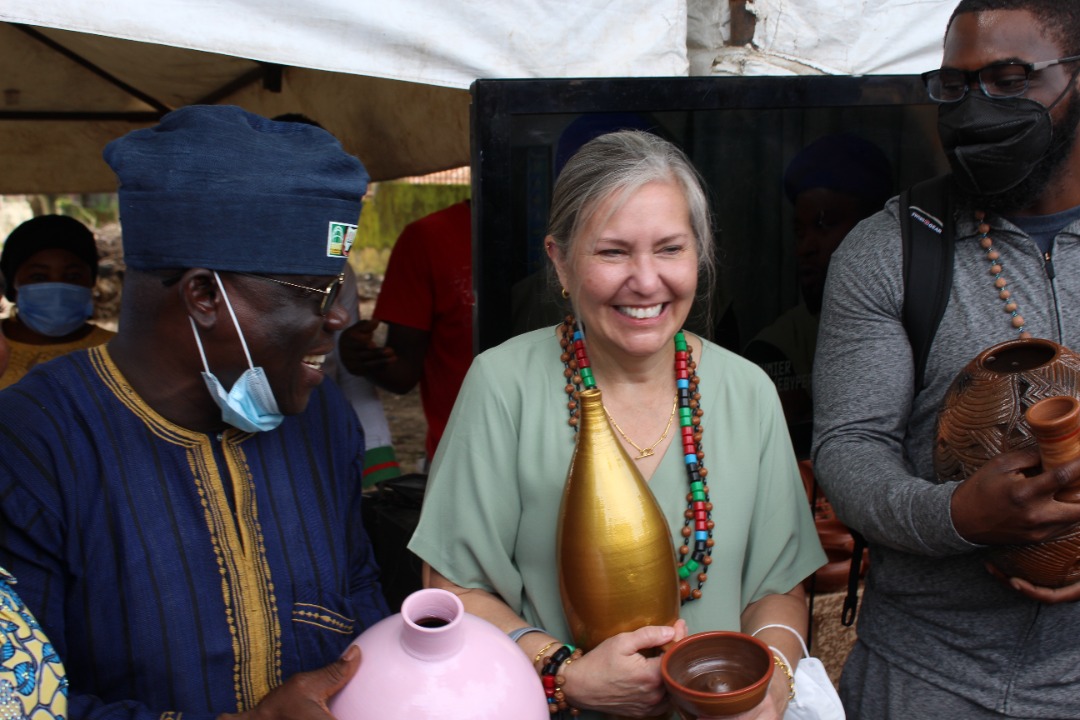Abubakar Yunusa, Abuja
As Nigeria grapples with debilitating revenue shortfalls, due to massive levels of oil theft and the volatility of crude in the international market, economists and national planning experts have for long talked about diversification of the economy as the way out.
Being the melting pot of hundreds of ethnic nationalities and cultures, Nigeria can create wealth if it can look inwards and tap the rich and vibrant cultural treasures in the country, while preserving vast repositories for generations unborn.
Although the government appears to be pondering how best to tap these cultural treasures, private foundations, and civil society organisations both at home and abroad have already swung into action, just as big and beneficial steps are being taken in the direction of inspiring cultural preservation as well as economic diversification.
That is exactly what is happening in Nigeria’s Federal Capital Territory (FCT), where the indigenous craft of pottery is receiving a new lease of life. Thanks to an ongoing two-year project implemented by the Resource Centre for Human Rights & Civic Education (CHRICED) with support from the John D. and Catherine T. MacArthur Foundation, the prospects for the revival of the craft of pottery are looking good. The project, which focuses on promoting the political, economic and cultural rights of FCT Original Inhabitants has in the last one year of implementation contributed immensely to ensuring the ancient craft of pottery bounces back as one of the economic mainstays of the locals in the FCT. The craft of pottery has in time past put Nigeria on the global tourism spotlight, especially with the exploits of FCT Original Inhabitants potters like the famous Ladi Kwali.

With the ongoing flurry of activities to put FCT Original Inhabitants pottery back on the map, the Ushafa Pottery Centre located in Bwari Area Council on the outskirts of the FCT has become Mecca of sorts. The Center has since been drawing the attention of both international and local tourists to Nigeria. It was established in 1990 by a former First Lady, Maryam Babangida, under the Better Life for Rural Women program. The former First Lady’s vision was for the Centre to become the activity point for showcasing the skill and creativity of the women potters of Ushafa community. As such, it was designed to attract tourists, visitors, and patrons of pottery in order to empower rural women, whose major occupation is pottery.
The Explainer gathered that the late Maryam Babangida did her best to market the pottery center, thereby attracting world leaders to the humble setting. In 2000, former US President, Bill Clinton visited the center attracting massive national and global attention to the Ushafa community and its creative potters.
Other world leaders like Egyptian President, Hosni Mubarak and Swiss Vice President, Ruth Metzier among others visited. Many thronged the place to buy the beautiful pottery, while others like professional potters and students came on an excursion to learn and watch the women make pots with clay from start to finish.
Part of the program strategy to return pottery to its place of pride in FCT Original Inhabitants communities is to ensure generational transfer of knowledge. As such, CHRICED has been supporting Mairo Women Foundation to train young Original Inhabitants to acquire the skill of pottery.
There is assurance that this approach would ensure inter-generational transfer of pottery knowledge and skills, while addressing the problem of youth unemployment. Some of these program outcomes came to the fore at the weekend, when the MacArthur Foundation delegation, led by Managing Director Stephanie Platz toured the Ushafa Pottery Centre.

Fielding questions from journalists after taking a close view of activities at the Centre, Platz expressed excitement that the cultural treasures of the FCT Original Inhabitants are being revived.
She said: “It is very exciting to see the culture of the original inhabitants coming to life. I’m so excited about the train the trainer’s model that allows people to go to their communities, resuscitate their traditions and bring them to the market so everyone can enjoy them, while also providing income for the artists and the artisans. This is a very exciting visit and I’m so impressed with what I’m seeing here.
Congratulations to CHRICED and to the Mario Women’s Foundation and to all of the artisans that are working here.”
On his part, CHRICED Executive Director, Comrade Dr. Ibrahim M. ZIkirullahi, said: “The Original Inhabitants of Abuja have existed for many centuries years but coming of the new capital, which is the Federal Capital Territory (FCT), has almost eroded their cultural heritage, their cultural repository, and so nobody talks about their culture anymore. So we know that all these cultures, if they are not preserved over time, will totally and completely die. That is why we made it a priority to promote the rights of the Original Inhabitants in the FCT.”
Dr. Ibrahim stressed that government has a major role to play in resuscitating FCTOI culture. He said: “The institutions are there, but whether they are doing what they are supposed to do is a different thing entirely. We can’t just leave it to the government and wait for them to do it the way they want to do it. So what we are doing is also a big challenge to the government to wake up to their responsibility,” he said.



















